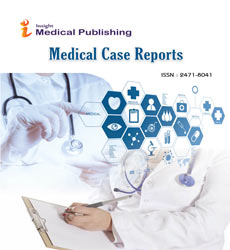Coronavirus Immunization Acknowledgment, Aversion, and Refusal among Canadian Medical Care Laborers
Mona Andrews
Department of Medicine, Division of Infectious Diseases and Geographic Medicine, Stanford University School of Medicine, Stanford, CA, USA
Published Date: 2022-04-28DOI10.36648/2471-8041.8.4.223
Mona Andrews*
Department of Medicine, Division of Infectious Diseases and Geographic Medicine, Stanford University School of Medicine, Stanford, CA, USA.
- Corresponding Author:
- Mona Andrews
Department of Medicine, Division of Infectious Diseases and Geographic Medicine, Stanford University School of Medicine, Stanford, CA, USA.
E-mail: mona_andrews@yahoo.com
Received: March 28, 2022, Manuscript No. IPMCRS-22-13504; Editor assigned: March 30, 2022, PreQC No. IPMCRS-22-13504 (PQ); Reviewed: April 11, 2022, QC No. IPMCRS-22-13504; Revised: April 21, 2022, Manuscript No. IPMCRS-22-13504 (R); Published: April 28, 2022, DOI: 10.36648/2471-8041.8.4.223.
Citation: Andrews M (2022) Coronavirus Immunization Acknowledgment, Aversion, and Refusal among Canadian Medical Care Laborers. Med Case Rep Vol. 8 No.4:223.
Introduction
Carrera offices are high-risk settings for COVID-19 transmission. Factors related with COVID-19 antibody acknowledgment and reluctance among detained people is inadequately perceived, particularly among prison occupants. Here, we directed a review audit of Electronic Wellbeing Record (EWR) information on COVID-19 immunization take-up in authority and moreover controlled a study to survey explanations behind antibody aversion, wellsprings of COVID-19 data, and clinical question among inhabitants of four Northern California correctional facilities. We performed multivariate calculated relapse to decide relationship with immunization acknowledgment. Of 2,564 prison inhabitants offered a COVID-19 antibody acknowledged somewhere around one portion. Among inoculated inhabitants, 497 (34.5%) had at first declined. Antibody take-up was higher among more established people, ladies, those with late influenza immunization, and those living in shared lodging. Among 509 overview respondents, driving purposes behind immunization aversion were worries around aftereffects and sub-standard viability, with cost and the requirement for a yearly promoter being other speculative obstructions to inoculation. Immunization reluctance was additionally connected with doubt of clinical faculty all through prison, albeit this affiliation fluctuated by race/nationality. TV and companions/family were the most widely recognized and most confided in wellsprings of COVID-19 data, individually. By and large, immunization acknowledgment was a lot of lower among prison occupants than the neighborhood and public all inclusive community. Intercessions to increment inoculation rates in this setting ought to use open and confided in wellsprings of data to address worries about secondary effects and adequacy, while attempting to alleviate clinical and institutional doubt among occupants. In spite of the fact that liquor builds the gamble of disease, familiarity with liquor related malignant growth chances is low. Liquor use is common among youthful grown-ups, and understanding elements related with mindfulness and impression of liquor related disease gambles in this gathering is basic for malignant growth avoidance endeavors. We analyzed the segment, tobacco, and liquor related connects of youthful grown-ups' mindfulness and view of liquor as a conduct risk factor for disease. Members revealed consciousness of liquor as a gamble factor for malignant growth and saw dangers of genuine infection like disease. We examined segment attributes, liquor use, and tobacco utilize related with these result factors utilizing multivariable relapse. By and large, 18.5% of members accepted that liquor doesn't increment malignant growth risk. Seen malignant growth risk related with liquor use was moderate. In multivariable investigation, attention to risk was fundamentally higher among those with higher financial status. Seen risk was fundamentally more prominent among those with higher financial status, higher liquor utilization, and a background marked by tobacco use. These discoveries show research is justified to more readily comprehend consciousness of liquor as a conduct risk factor for malignant growth and related convictions in subgroups of youthful grown-ups to assist with directing the improvement of mediations to bring issues to light of the dangers of disease related with liquor use. Smokers are at more serious gamble of various ailments that are exacerbated by ecological risks related with low lodging quality. Notwithstanding, little is had some significant awareness of the commonness of low lodging quality among low-pay smokers. Utilizing connections and calculated relapse, we analyzed relationship among eight lodging quality pointers-bugs, water spills, shape, lead paint, and working smoke alarms, machines, warming, and cooling and between lodging quality and social requirements, burdensome side effects, saw pressure, rest issues, and self-appraised wellbeing locally based example of low-pay smokers from states.
Most members were female, and White or African-American. One out of four finished not exactly secondary school training, and 41% revealed yearly pre-charge family pay of under $10,000. It was normal to House quality issues. Most members detailed somewhere around one issue in their home, and revealed at least two issues, most ordinarily bug invasions, water spills absence of cooling and form. Absence of hotness and cooling were related, as were water holes and form. Utilizing calculated relapse examinations controlling for member segment attributes, we observed that revealing really lodging quality issues was related with more noteworthy chances of more awful mental and actual wellbeing results. Various wellbeing dangers, including lodging quality, burdensome side effects, stress, unfortunate rest, and monetary strain might be commonly supporting and compound the wellbeing result of smoking. Future examination ought to look to recreate these discoveries in different examples, and inspect affiliations longitudinally to all the more likely get causality.
Cigarette giving is inescapable in China. As the Chinese are progressively mindful of damage from smoking cigarettes, e-cigarettes, regularly advanced as less unsafe options in contrast to cigarettes, might be considered proper gifts. This study is the main utilizing populace based review information to analyze getting and giving e-cigarettes as gifts in China. We investigated 9,274 grown-ups from wave 5 of the international tobacco control china survey. We tracked down that the commonness of getting e-cigarettes as gifts was 1.3% among all respondents and 5.3% among metropolitan smokers; the pervasiveness of giving e-cigarettes as gifts was 0.5% among all respondents and 1.2% among metropolitan smokers. These pervasiveness gauges were extremely low among non-smokers and country respondents. Further investigation on metropolitan smokers tracked down that those matured 40-54 and 55+, those with high schooling levels, weighty smokers, and the individuals who saw e-cigarettes as similarly/more unsafe as cigarettes were bound to get e-cigarette gifts; and the people who at any point utilized e-cigarettes were essentially bound to both get and give e-cigarette gifts. Metropolitan smokers with uplifting outlook about cigarette giving were likewise bound to give e-cigarette gifts to other people, yet those matured 55+ were less inclined to gift e-cigarettes. Discoveries of this study demonstrate that the Chinese might see e-cigarettes as proper gifts for smokers, particularly weighty smokers. Precautionary measures ought to be taken to forestall e-cigarettes from turning into a gift decision for nonsmokers. Wellbeing efforts intended to battle the social acknowledgment of cigarette giving may likewise assist with lessening e-cigarette giving. The COVID-19 pandemic brought about quick execution of health inside essential consideration affecting malignant growth screening. We tried to survey the effect of expanded health use on doctor proposal for disease screenings during the COVID-19 pandemic in North America.
Malignant Growth Screening Rehearses
Essential consideration doctors were studied in fall 2020 through the Council of Academic Family Medicine's Educational Research Alliance (CERA) general enrollment review. Respondents were gotten some information about malignant growth screening rehearses and health administrations during the COVID-19 pandemic. Chi-squared tests were performed to evaluate connections between malignant growth screening practices and changes in care required by the shift to health administrations. Relationship between member reactions and those announcing a decreased patient-supplier relationship were surveyed with multivariable calculated relapse. A significant extent of respondents revealed delaying evaluating for bosom (34.5%), colon (32.9%), and cervical malignant growth (31%), and a larger part (51.1%) concurred changes in care looking for will prompt expanded occurrence of late stage disease. Doctors revealed high utilization of health during the pandemic, yet supported restrictions in its utilization to keep up with malignant growth screening rehearses and the patient-supplier relationship. Doctors who detailed patients were hesitant to come into the workplace were bound to report a hindered patient-supplier relationship. Doctors who detailed that health keeps up with their patient-supplier relationship were less inclined to report a weakened patient-supplier relationship. As health turns out to be progressively noticeable, assessment of the effect of health on malignant growth screening and patient-supplier connections will be progressively significant for essential consideration. Nervousness related with the COVID-19 pandemic and home restriction has been related with antagonistic wellbeing ways of behaving, like undesirable eating, smoking, and drinking. In any case, most investigations have been restricted by local testing, which blocks the assessment of social outcomes related with the pandemic at a worldwide level. Further, not many examinations operationalized pandemic-related stressors to empower the examination of the effect of various sorts of stressors on wellbeing results.
Investigation of Mental and Social Corresponds
This study analyzed the relationship between saw chance of COVID-19 contamination and monetary weight of COVID-19 with wellbeing advancing and wellbeing harming ways of behaving utilizing information from the Corona Study: a global, longitudinal internet based investigation of mental and social corresponds of COVID-1. Members finished self-report proportions of COVID-19 disease risk, COVID-19-related financial weight, actual activity, diet quality, cigarette smoking, rest quality, and hard-core boozing. Staggered primary condition displaying investigations showed that across three time focuses saw monetary weight was related with decreased diet quality and rest quality, as well as expanded smoking. Diet quality and rest quality were most reduced among respondents who saw high COVID-19 disease risk joined with high financial weight. Neither hitting the bottle hard nor practice was related with apparent COVID-19 contamination risk, financial weight, or their connection. Discoveries highlight the benefit of creating intercessions to address COVID-related stressors, which affect wellbeing ways of behaving that, thus, may impact weakness to COVID-19 and other wellbeing results.

Open Access Journals
- Aquaculture & Veterinary Science
- Chemistry & Chemical Sciences
- Clinical Sciences
- Engineering
- General Science
- Genetics & Molecular Biology
- Health Care & Nursing
- Immunology & Microbiology
- Materials Science
- Mathematics & Physics
- Medical Sciences
- Neurology & Psychiatry
- Oncology & Cancer Science
- Pharmaceutical Sciences
